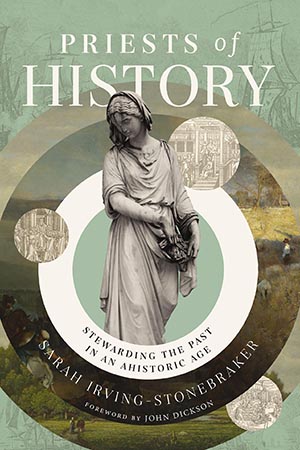Ahistory Lessons
What happens when we neglect the past? According to Priests of History, this:
1.
We see the past as
a source of shame and oppression from which
we must free ourselves
2.
We do not think of ourselves as part of historical communities
3.
Our societies are increasingly ignorant
of history
4.
We do not believe history has a narrative or a purpose
5.
We are unable to reason well, and disagree peaceably, about the ethical complexities
of the past

Priests of History:
Stewarding the Past in an Ahistoric Age
By Sarah Irving-Stonebraker
(Zondervan Reflective
2024)
It has been almost three years since Jonathan Haidt famously observed in America a serious problem (not, of course, its first). “The past ten years of American life have been uniquely stupid,” read the headline of his widely read 2022 essay in The Atlantic. Haidt makes sense of this observation with a reflection on the story of the tower of Babel, the Old Testament episode in which God confuses humanity’s language and decentralizes its civilization. Again, he argues, a significant cultural shift has contributed to a critical disconnect. We struggle (and sometimes outright refuse) to understand one another.
Social media is a contributor, for one. It’s made for living as a consumer, as a person who is right, who stands out from the rest. In her new book Priests of History: Stewarding the Past in an Ahistoric Age, Sarah Irving-Stonebraker adds: “Social media accentuates the ahistorical sense that life is all about relentless self-creation.” But a fixation on oneself is far from self-governing; it’s short sighted. To understand who we are as individuals, we have to look beyond ourselves, to family, community, and more. Understanding the past is a part of that. This is the work of history.
History informs who we are, what we know, what we imagine, how we choose. For Irving-Stonebraker, that seems to be where our problem lies.
She calls this moment we’re living the “ahistoric age,” by which she means, in short, “we have largely ceased to think of ourselves as historical beings.” Instead, we’re living in an all-now world. This shift has not come without consequences.
“In the past decade or so, we have come to know less than ever about history, and both individually and collectively we are losing the ability to grapple with history’s ethical complexities without descending into culture wars,” Irving-Stonebraker writes.
Christians should feel this loss sharply. As historian David Armitage has argued, history forms an essential part of human flourishing: “Human flourishing — the individual’s maximization of her human capabilities, and our collective endeavor to realize the best for humanity as a whole — is at once present-centered, future-oriented, and past dependent,” he writes in a contribution to the book History and Human Flourishing. If Christians are “agents of flourishing,” as Amy Sherman has written, then that loss presents risk that the church cannot ignore.
Where this ahistoricism settles, a few dangerous ideas seem to as well: “We view our past as irrelevant, or we are ignorant of it, or we have an ideological view that the past is inferior to the latest fashionable idea,” writes Irving-Stonebraker. One of the most dire mistakes that follows is that Christians miss their own story — as God’s people.
Augustine in his Confessions makes a few useful reflections on time itself. As Armitage summarizes, “In Book XI, Augustine continues a dialogue with God that has occupied most of the book and tells his Lord that, because eternity is his, everything Augustine confesses to him will be in the nature of a reminder not a revelation.”
This is because in God’s omniscience he holds the past, the present, and the future at once. Though we have hope for the future, we only have now the present and the past. For Christians, tending the present and keeping the past, as Irving-Stonebraker argues, is priestly work.





